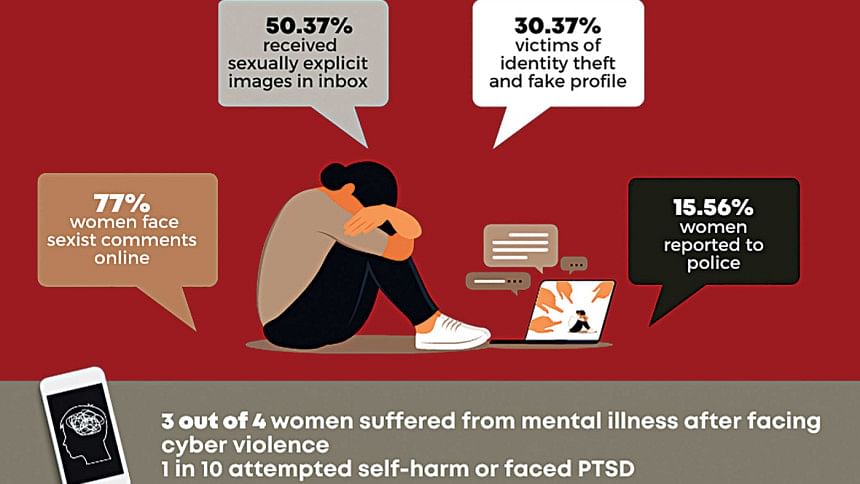Make online spaces safer for women

It is disappointing, but not surprising, that the real-life abuse of women in our country has also spilled over to our digital spaces. According to the findings of a survey by ActionAid Bangladesh in partnership with Prothom Alo, 77 percent of its respondents faced sexist or misogynistic comments online, while 50.37 percent received explicit images in their messages on social media. Moreover, 30.37 percent of women were victims of identity theft and fake profiles, 23.70 percent faced non-consensual dissemination of intimate photos, and 19.26 percent faced cyberstalking.
The anonymity that social media lends to individuals leads abusers to believe that their comments have no impact, or that what they are doing is not wrong, or that they can get away with whatever they want. Such a belief is strengthened by the fact that most victims are reluctant to take legal action against online abusers. As the survey found, only 15.56 percent of victims reported incidents of cyberbullying to the police, while 2.22 percent spoke to lawyers about it. A vast majority kept the incidents to themselves or only shared them with friends and families. This happens either due to fear or because of how normalised abuse of women has become in our society—be it online or offline.
One would think that the solution to the online abuse of women would be the implementation of the Digital Security Act (DSA), 2018. However, its history of being used arbitrarily to muzzle free speech has made it seem as if the law was not enacted to benefit the general public. Experts say that the DSA, as it is, has not put emphasis on curbing cybercrimes against women, and that reforms are needed so that it can be used to combat such problems. And while helpline numbers—such as 999 (national emergency hotline) and 109 (the national helpline centre for violence against women and children)—do exist, women who face abuse online often do not turn to these resources for help due to a lack of knowledge about them, or fear of inaction and further psychological distress/stigmatisation of their situation.
We urge the government and law enforcement agencies to prioritise the safety of women in cyberspace—by promoting existing helpline numbers, reforming the DSA to better serve female victims of online harassment, and making the reporting of such incidents easier and more accessible. While online abuse takes place on the internet, the trauma from it is experienced by real women and affects their lives and safety in real life. Victims should be able to turn to the justice system for help in this regard without hesitation, and abusers should be punished accordingly if we are to make our digital space safe for all citizens.

 For all latest news, follow The Daily Star's Google News channel.
For all latest news, follow The Daily Star's Google News channel. 



Comments